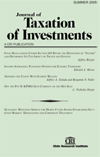The Tax Paradox of Capital Investment
Author: Bret N. Bogenschneider.
Source: Volume 33, Number 01, Fall 2015 , pp.59-78(20)

< previous article |next article > |return to table of contents
Abstract:
The historical economic data imply a significant “tax paradox”: Higher-tax nations tend to experience relatively higher rates of economic growth over time. Neoclassical economic theory implies, to the contrary, that lower-tax nations ought to grow faster than high-tax nations since capital is mobile. However, because new capital investment is generally tax deductible, marginal capital investment often favors active (i.e., high-growth) investment for tax deductibility reasons, resulting in a preference for incremental capital investment in higher-tax nations. ”Tax practitioner” economics is not always consistent with neoclassical economic theory. In this article, the author explains why corruption is disproportionately harmful to economic growth (in short, corruption directly undermines the incentive for re-investment of capital, killing active capital investment via immediate taxation of profits); explains from a tax-practitioner perspective why the Tax Reform Act of 1986 caused a reversal of the “lock-in effect,” resulting in a short-term economic boost; and posits that levying taxes on labor to try to attract “mobile” capital has the paradoxical effect of a potential reduction in mobile capital investment in a given economy.Keywords: tax paradox, lock-in effect, small open economy
Affiliations:
1: Vienna University of Economics and Business.